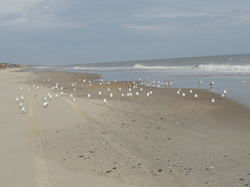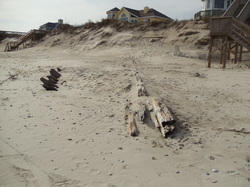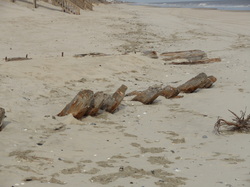
next stage in the devolution of this experience was threatening to reminisce about fishing, where younger members of the party (those under 60) were taunted with threats to tell all about certain long-dead fish whose bizarre fate was to be among the very few fish ever caught by anyone we knew personally. Eventually this threat became meaningless. Our memory of these luckless individuals has become vague.
enough to blow the seashells off the porch and turn the deck chairs over. The storm-furrows of the gray-green Atlantic piled wave on foaming wave against the beach. Somehow there was a fishing boat out in this, not much more than 300 yards off the beach, bucking up and down like a ride in an amusement park,
although I doubt amusement was a widespread emotion on the boat. The stern would ride up and the bow would plunge under and then the reverse would happen, the bow would rise up and pour water the length of the boat with a "Here, drink this" motion while the stern went under. Of course boats in these circumstances also wallow from side to side like a hog in mud, making seasickness a real possibility. We wondered if this would have been safer or less safe if the boat had been slightly larger or slightly farther off the famous ship-eating sandbanks. We wondered why they were motoring north against the wind, when this plainly resulted in barely any headway.
This ridiculous theory was dismissed immediately. Even Jason and the Argonauts couldn't get a hook into the water under these conditions. Binoculars revealed no signs of humans on board, suggesting everyone had long since been swept off into the sea. However, someone was plainly steering this vessel; otherwise it would have already been up in the dunes like many a bad idea before it. The survivors had probably all lashed themselves to the railings -- it's practically traditional.
It took the Flying Dutchman most of an hour to slug past the house through the breakers. I imagine the trip back south went much faster. They were probably fishing for adjectives. Some of the wildest and rarest strings of adjectives in any language would be caught under just these conditions.

This was like old times. I first visited the Outer Banks as a small child in 1956 and have seen a lot of it over the years since. In my childhood, and at least as recently as the 1970s, bits of ships were scarcely rare, probably better described as common, on these beaches. With the passage of time, with salvage and vandalism, and since there are fewer and fewer shipwrecks these days, demand has come to exceed supply by quite a lot, and the rare remnants of shipwrecks are about all there is to see today. But once in a while a great storm will excavate or drive ashore the moldering hulk of some past disaster, as in the case of this old schooner.

sands.”

 RSS Feed
RSS Feed